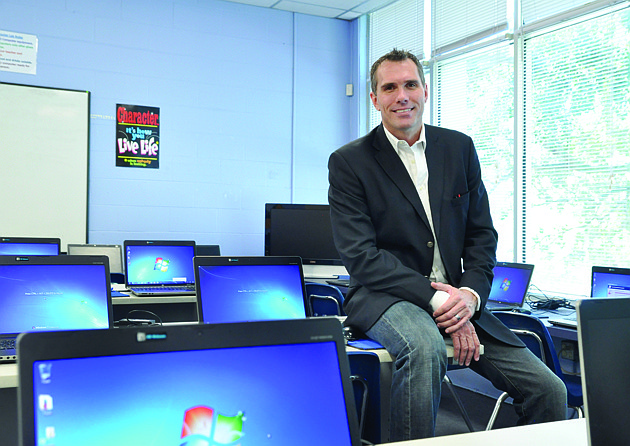Teachers know this challenge well: Every school child learns content in a different way.
So what if you could tailor curricula to students based on their attention and comprehension?
Fort Myers entrepreneur Adam Hall is working on that Holy Grail of education now with a new company he's formed called Nervanix. “It's all about personalized learning,” he says. “Everyone's trying to do that right now.”
Hall, 37, has a track record of success in the education technology field. He sold his prior company, Impact Education, to publishing giant Houghton Mifflin Harcourt Publishing in 2010 for an undisclosed sum.
Now, Hall is using some of the proceeds of that sale to launch Nervanix. He's partnered with a brain-sensor company called NeuroSky and hired software developers in India to create a system that can measure students' brain activity to help teachers and curriculum developers tailor content so students can learn better.
Although the concept is still being developed, Nervanix was runner-up at the innovation incubator awards held in New York City in December, sponsored by the Software & Information Industry Association. “We're almost ready to put it out there,” says Hall, noting the application could be ready this month.
Here's how it works: Students don a headband with a sensor that measures brain activity. Combined with the software and content in the form of a mobile application, a teacher can measure how well a student pays attention and comprehends any material.
Instead of teaching a subject in the same way to all students, a teacher using this technology would instruct groups of students who would be more receptive to one kind of lesson over another. “The textbook as we know it is dying,” Hall says, noting that publishers now all have a digital equivalent that can be presented in a variety of different ways.
Currently, Hall is in the process of selecting a university that will validate findings from testing 300 elementary students with the technology in Lake Charles, La. “By June we'll have our research results,” Hall says.
For now, Hall says he isn't looking for investors. “I think I can bootstrap the thing,” he says, declining to share financial details or sales forecasts.
Hall says he faces several challenges. For starters, students are unlikely to wear the brain-monitoring headbands on a daily basis. Instead, he envisions them using the technology once a quarter or using it voluntarily as a self-analysis tool.
Another challenge is the privacy issue. That's why Hall doesn't plan to manage data for schools except perhaps in aggregate to track how well his technology is working. He's concerned that there's legislation brewing that would ban schools from using such biofeedback technology to test students. “It's tragic because we have the ability to personalize,” Hall says.
Fact is, Hall says there are billions of dollars available to schools from the federal government for the kind of targeted and custom-tailored education that would help students of all backgrounds and abilities.
If he finds U.S. schools unreceptive to his technology, Hall says he might start selling Nervanix overseas. He says schools in Asian countries such as Singapore and South Korea are particularly interested. “It might be the first markets we go to,” he says.






